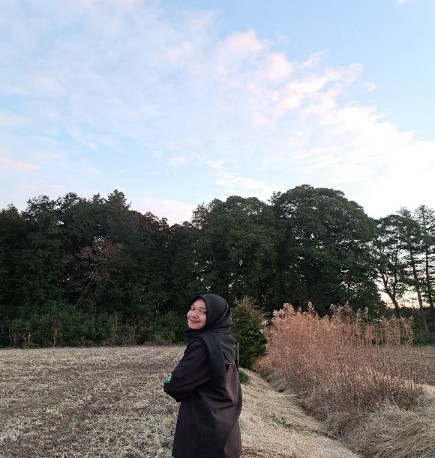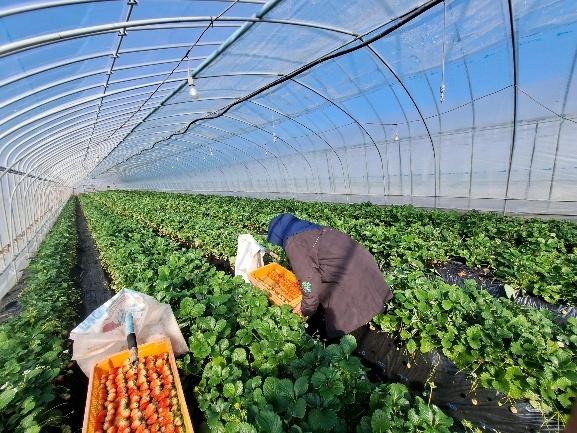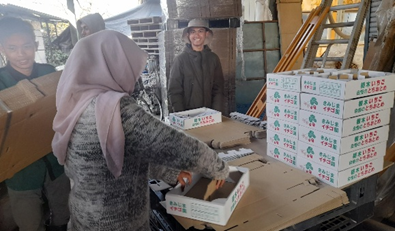

Mahasiswa FPP UMM sedang Melakukan Panen pada Kebun Stroberi (Dokpri)
MALANG — Students of the Faculty of Agriculture and Animal Husbandry of UMM have again received an internship opportunity in Japan. On Sunday (15/01), they departed for Japan. Four of the University of Muhammadiyah Malang students who received an internship opportunity at a company in Japan were students from the Faculty of Agriculture and Animal Husbandry of UMM. These apprentices will later undergo work practices or internships at accepting companies in Japan. The company where they do their internship is a company that is certainly engaged in agriculture, namely Kimijima Nouen which is located in Yaita City, Tochigi Prefecture.
All of the UMM FPP students received provisions before they departed for Japan. On Thursday (12/01), they conducted a debriefing at LPK Lingua Global Utama, located in Bandung. LPK Lingua Global Utama is a job training institution engaged in foreign language training and also job training for prospective workers (HR) who will do internships and work in Japan. This internship program is very useful in international cooperation and also in state contributions. After carrying out the training, these students departed on Sunday (15/01) with the departure route from Jakarta - Manila - Tokyo. The internship program they are undergoing will be carried out over 3 months starting from January 17 to April 13, 2023.
Companies in Japan are generally active on average only Monday to Friday. The working hours each day are eight hours, not including rest hours. Companies in Japan usually have divided breaks.
“Here, we start activities from 7 am to 4 pm. From these hours, we can take a 15-minute break at 10 o'clock and a 30-minute break at noon. Usually, companies in Japan have a short break of about 15 minutes, before the afternoon break begins. Then, during the afternoon break, it is used for lunch for approximately 30 minutes and there is also an additional short break after a lunch break of around 15 minutes. For the Muslim internship students, they will take advantage of their afternoon break to perform the midday prayer, and the Asr prayer will be carried out after they return home." Said Nadira, one of the UMM Animal Husbandry Faculty students who attended an internship in Japan.
During their internship in Japan, they study and work according to direct instructions directed by guides from Japan. Therefore, the importance of Japanese language skills for daily conversation there is very much needed to communicate with their co-workers. "However, in the company where we do internships, it can be said that quite a lot of seniors come from Indonesia, so this makes it easier for us in the process of explaining work procedures," said one UMM FPP student who was also an apprentice to Japan.
The knowledge they get from the Kimijima Noueun company is a lot, starting from the most basic things, namely discipline, accuracy in work, to honesty. Of course, that's not all they got. There, of course, they are also taught sciences related to agriculture.
"In terms of agricultural science, maybe we haven't learned too much, because we have only been here for 2 weeks. And again, when we come home, we enter the harvest season, so while we are here, maybe we will only learn about that," said Nadira
"But... the harvesting process can't be said to be that easy either. The height factor of the plant is only as tall as our calves, so it makes us a bit difficult during the harvesting process. Plus during the process, we have to walk down to reach the plants while pushing a cart filled with hako (basket for the strawberries). In this harvesting process, you also have to pay attention to how you pick the strawberries, you can't just pick them carelessly," added Nadira
UMM Faculty of Animal Husbandry Forestry Student, Nadira, also explained that when picking or harvesting strawberries many factors need to be considered, namely when picking you can't leave the fruit stalks, when picking the fruit you can't get blisters, how to arrange the strawberries in the basket must also be correct not carelessly, the color of the strawberries you pick shouldn't be too red, and you can't have too much white. "So, indeed the strawberries that are sold in the market are the best strawberries that have really good quality in the company." Nadir
Any problems or things that are not understood by the apprentices will later be explained by the person in charge who guides the apprentices. In the second week, the apprentices will be released and also given more responsibility to carry out their work without any further assistance. However, apprentices will still be monitored and given directions when they make mistakes that are not following the workflow.

UMM FPP student apprentices are wrapping strawberries into their packaging boxes (Dokpri)
The strawberry harvest is highly dependent on the weather in Japan. If yesterday's weather was overcast or not hot, today's harvest will be small and will be finished sooner. However, if the weather was sunny or hot yesterday, today's harvest will be large and will take longer to finish. Sometimes it can even exceed the time to go home, which is five o'clock in the afternoon. After the harvesting work was finished, we continued to help the packing section fold several cardboard boxes.
While the internship program is running, during that time the apprentices will learn the work process at the company "Kimijima Nouen" which is engaged in Japanese strawberry farming. In Japan as a whole there are no diverse strawberry cultivation methods. Japan has four seasons, which is why strawberry planting is done carefully, and of course, each season requires special attention that is different from the local climate. The selection of strawberry varieties is also very noteworthy. At the Kimijima Noueun company, there are three varieties used, namely touchstone, Chitika, and sky berry.
“The greenhouse is also different from the one in Indonesia because here it is equipped with room temperature controllers, water-nutrient watering regulators, ground heating, CO gas, and rooms. CO gas is given by being blown into the greenhouse just before sunrise to help the growth of strawberries. There is also a water pressure controller that flows through the pipes to water the soil for the strawberry plant media. The greenhouse is also equipped with several layers of plastic cover to adjust the room temperature in the greenhouse which can be opened and closed automatically with a wire. There is also a plastic layer that he opens when the sun is shining so the fruit can ripen quickly.” Nadira explained when discussing greenhouses in her internship company.
Nadira explained, "The number one and main motivation is asking for the blessing of your parents. Then, what needs to be prepared, namely registration documents (passport and so on), Japanese language courses because this is very important for communication with other workers, mentally, with thoughts that are always optimistic because 'we become what we think about', we will become what we always think we are.”